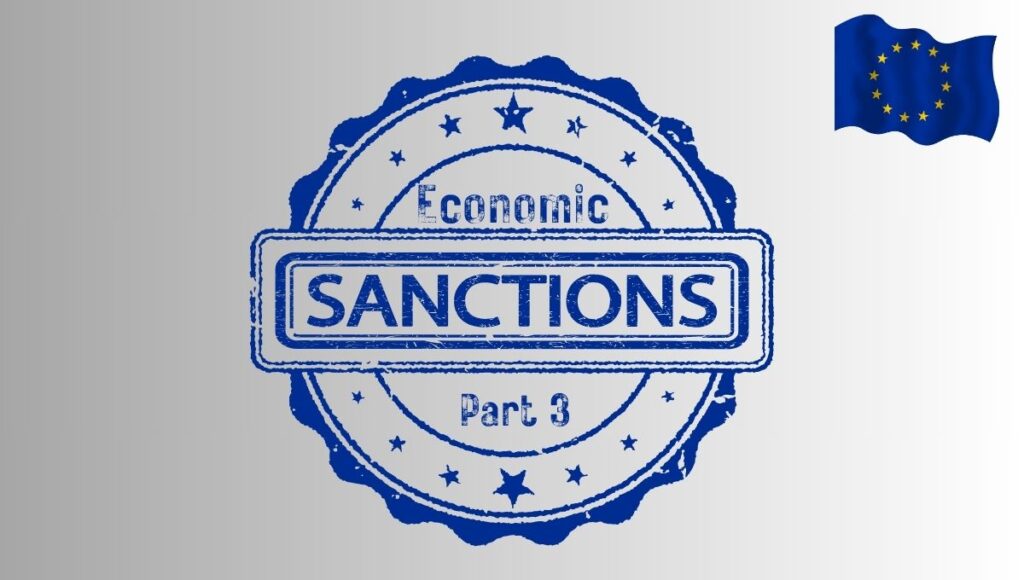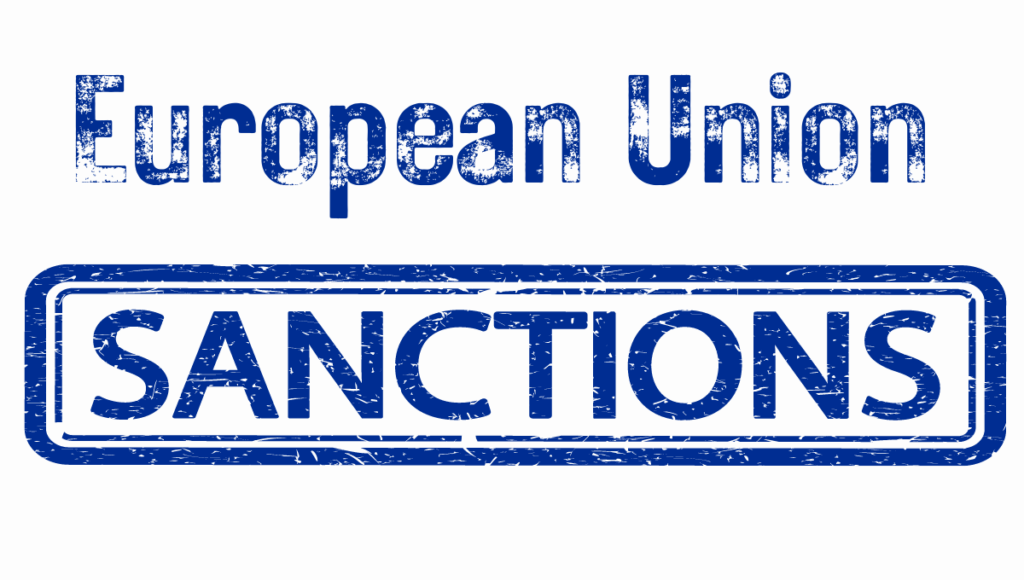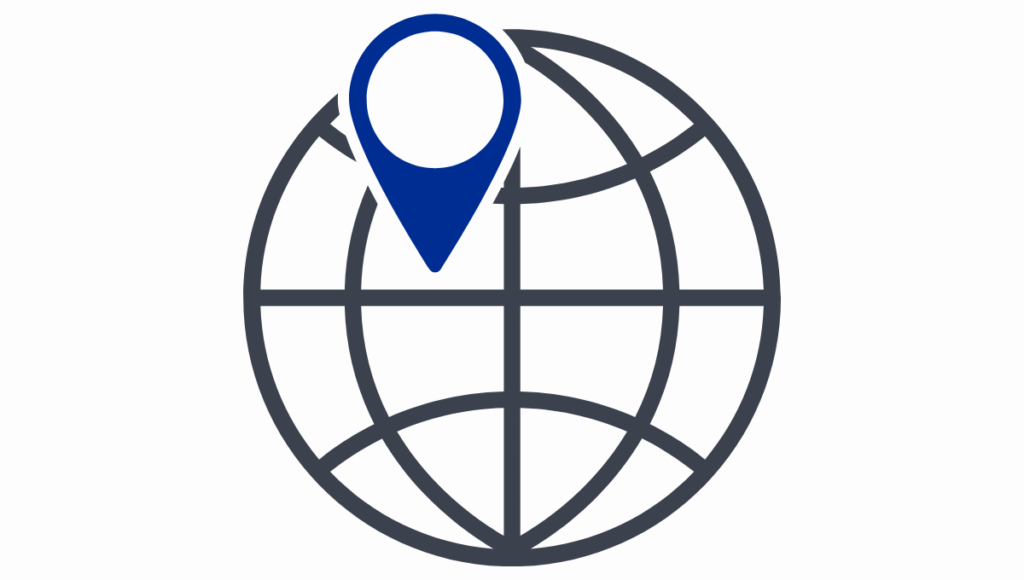Apr 3, 2024
Do You Know the Important Facts About EU Sanctions?
DiligenceResources

Economic sanctions are a diligence topic for all organizations. Are you familiar with the European Union Sanctions and the impact on you?
Every country in existence is impacted by global economic sanctions. Either as a user of economic sanctions, as a target or as a “bystander” of sanction use by or against another country.
Economic sanctions are in the news – everywhere – because economic sanctions parallel ongoing global issues including, wars, corruption, criminality, and humanitarian rights. But sanctions aren’t only a news story. Economic sanctions are a foreign policy tool, an enforcement mechanism and even a global behavior modification strategy.
If you are not familiar with, or could use a short update on, the definition and some universal concepts that apply to most economic sanctions take a look at Part 1 of this economic sanctions series. If you are unfamiliar with United Nations Sanctions which form a basis for a type of European Union (EU) Sanctions take a look at Part 2 of this economic sanctions series
Today, in Part 3 of the economic sanctions series, I will focus on the EU sanctions which are called sanction regimes. The topics covered are:
- What do the EU sanction regimes mean for your diligence?
- How are global sanctions structured?
- How is the EU a part of the global sanction system?
- Which countries follow EU sanctions regimes?
- How are they applied?
- What are current EU sanction regimes?
- Where do you find the consolidated list?
1. What do the EU sanction regimes mean for your diligence?
The EU sanctions are the law of all 27 EU member states. In addition there are a number of European countries that are not members of the EU but may have enacted their own parallel sanction regimes (see below).
According the the EU, the economic sanctions apply:
- within the jurisdiction (territory) of the EU;
- to EU nationals in any location;
- to companies and organisations incorporated under the law of a Member State – including branches of EU companies in third countries;
- on board aircraft or vessels under Member States´ jurisdiction.
So, even if you are not located in an EU jurisdiction or organized under the laws of the EU, if for example you:
- do business with
- any EU national
- a company that is incorporated in an EU member state,
- do business in any EU country, such as having clients, products or sales
- employ any person who is an EU national
The EU sanctions regimes will impact your business and will be a key diligence topic. What this means is that you need to perform the diligence to understand how the EU sanctions regimes impact your business.
If they do have an impact you will need to create and implement a plan for compliance.
If you decide that they do not apply you will want to document that diligence.
In both circumstances you will want to perform diligence to monitor both the regulations and your business for ongoing compliance.
A few general words of caution – don’t assume that EU :
- sanctions will not have any impact on your organization or how your operate your business – you don’t know if you don’t look
- size exempts you from sanctions
- outsourcing means you don’t have any responsibility for sanction compliance
- sanctions don’t apply to, or impact your dealings with customers, patrons, suppliers, trading partners, consultants, business partners and other entities
- you can operate your business, profit or not profit, online in a global, digital world and have no sanction compliance obligations
The only way you will know what applies to you, your organization, your business and your activities is to perform diligence. If you don’t know what to do, you may need to hire someone who is a sanctions expert. An individual or firm that is knowledgeable about your industry and impact of the laws and regulations of your country and wherever you do business.
2. How are global sanctions structured?
Global sanctions are multilateral sanctions, meaning common sanctions are imposed by a group of countries against a common target. In the case of the EU, 27 member states have by force of law, the same sanction regimes against common targets.
For multilateral sanctions to be created and succeed there needs to be a level of consensus among the creators (countries) of the sanctions regarding: (i) the need for the sanction, (ii) the target, (iii) the type of sanction, (iv) the monitoring and enforcement methods, both with respect to the target as well as those that are required to comply with the sanction. To accomplish this there has to be an infrastructure to assume the administrative and ongoing processes and procedures such as monitoring, reporting, and modification of the sanctions.
The structure of the EU accommodates the requirements for multilateral sanction creation and enforcement.

3. How is the EU a part of the global sanction system?
Types
The EU imposes two types of sanctions:
- United Nations mandated sanctions – which means they originate from the authority of the UN sanction resolutions, to learn more about UN sanctions see Part 2 of this series; and
- Autonomous sanctions – which are sanctions initiated by the EU rather than in compliance with a UN resolutions. For example, the EU has its own Global Human Rights Sanctions Regime (EUGHRSR)
Sometimes there is reference to a third type of EU sanction which is actually a hybrid of these two types. These are sanctions that are mandated by UN resolutions but are more restrictive than the UN programs; those restrictions are initiated under the EU’s authority.
Because the EU is a part of the UN sanction regime through each of its state’s membership in the UN and because the EU itself is a multi-state membership organization with its own territory, EU sanctions impact multiple countries and multiple individuals and entities.
Enactment of EU Sanction Regimes
The EU is a political and economic unit consisting of 27 member states. When a state (as in a country) wants to join the EU it must meet certain economic, legal and political criteria and when the ascension process is complete (it can take many years) it agrees to be bound by the treaties that enumerate the principles, structure and responsibilities of the EU and its members. This includes agreeing to abide by the laws and regulations that are promulgated by the EU.
EU sanction regimes are laws that are enacted through a legislative process by the Council of the EU (not to be confused with the European Council). The Council of the EU is the EU body responsible for the adoption, renewal and lifting of sanctions. EU Sanctions are a tool used in the promotion of the Common Foreign Security Policy (CFSC).
4. Which countries follow EU sanction regimes?
The answer is – every member state. If the Council of the EU imposes economic sanctions the members are compelled to apply them.
In addition, there are a group of countries that are not members of the EU but are “invited” to implement EU Sanctions:
- EU candidate countries,
- European Free Trade Association countries
- European Economic Area countries (e.g. Albania, Armenia, Bosnia and Herzegovina, Georgia, Iceland, Liechtenstein, Moldova, Montenegro, Norway, the Republic of North Macedonia, Serbia, Turkey and Ukraine)
5. How are they applied?
Member States
Each member state takes the action needed to implement, police and enforce the various EU sanction programs. Unlike UN Sanctions, EU laws are automatically binding as law on member states. This means that while a member may need to adjust a national law to reconcile it with the EU law, the EU law is binding without the need for national action.
The EU body that is responsible for assisting and insuring that members are correctly complying with the laws is the European Commission.
Practically, each member has to take the EU sanctions and:
- Monitor compliance based on the EU laws
- Enforce these sanction laws
- Impose consequences for non compliance
- Create any necessary administrative framework.
Penalties
If a member state does not comply with its responsibilities and commitments to implement EU law, the European Commission has the power to take legal action, it is called an infringement procedure.
If a person or entity subject to an EU sanction violates the sanction there are a number or possible penalties which may include a prison sentence. The European Parliament recently enacted a directive that harmonizes the penalties for sanction regime violations across the member states including prison sentences.
This is a directive so each EU member state must craft and enact the legislation needed to comply with the directive. The EU members have a year to do so.
“Invited Countries”
Countries that are invited to implement EU sanctions (these are not member states) and choose to do so, must take the necessary internal legislative action needed to adopt national legislation that is in line with the EU sanctions programs.
6. What are the current EU sanction regimes?
The EU imposes various levels of financial, trade, travel, arms embargoes and sports restrictions and bans to:
- promote peace and security
- prevent conflict
- support democracy and human rights
- defend the principles of international law
As of today there are over 40 EU sanction regimes. These include both the implementation of UN sanctions and autonomous sanctions. For statistics about the sanctions, the EU maintains a tracker that focuses on sanction statistics.
In addition this EU site has information about the various sanction programs organized by different criteria.
7. Where do you find the consolidated list?
The EU list is a consolidated list of all individuals and entities subject to EU Financial Sanctions.
- The list is available in multiple formats for download. It is updated from time to time. The most recent date of update is noted on the top right side of the front page of the site.
- There is also an ability to download the list at https://webgate.ec.europa.eu/fsd/fsf but to do so you need to establish an EU login account which is free.
- The one off search of the EU Financial Sanctions List is on the same site as the EU Sanctions Map. Right under the map there is an input form. This allows you to search the list.
Note that this list is for individuals and entities subject to financial sanctions, there is also another list of individuals that are subject to travel bans. There is an ability to request updates to the travel bans by providing your contact information.

The Big Picture
The EU sanction programs do not exist in a vacuum. They are part of a global effort to establish standards and norms of behavior across national boundaries. The EU maintains a number of resources and guidances that put their sanction work into the perspective of the global environment and the considerations that arise, including humanitarian aid and the impact on local populations. If you are involved in sanction diligence it is important to understand not only the restrictions but the context and the exceptions to the standards.
The EU sanctions regimes are dynamic. New sanctions regimes are added, lists change, program terms adjust, entities and individuals are delisted and programs are terminated. This is a reminder that diligence relating to sanctions must also be dynamic. This is not once and done diligence, instead this is an ongoing diligence responsibility. Compliance programs relating to sanctions must build in the diligence needed to stay compliant.
Join the Diligence File Email List – Subscribe Below – to Receive Free Ideas, Strategies and Resources For a Diligent Organization


Subscribe for Diligence Updates
Get the latest updates, resources, offers, and more.
"*" indicates required fields
The Diligence File respects your privacy. Privacy Policy